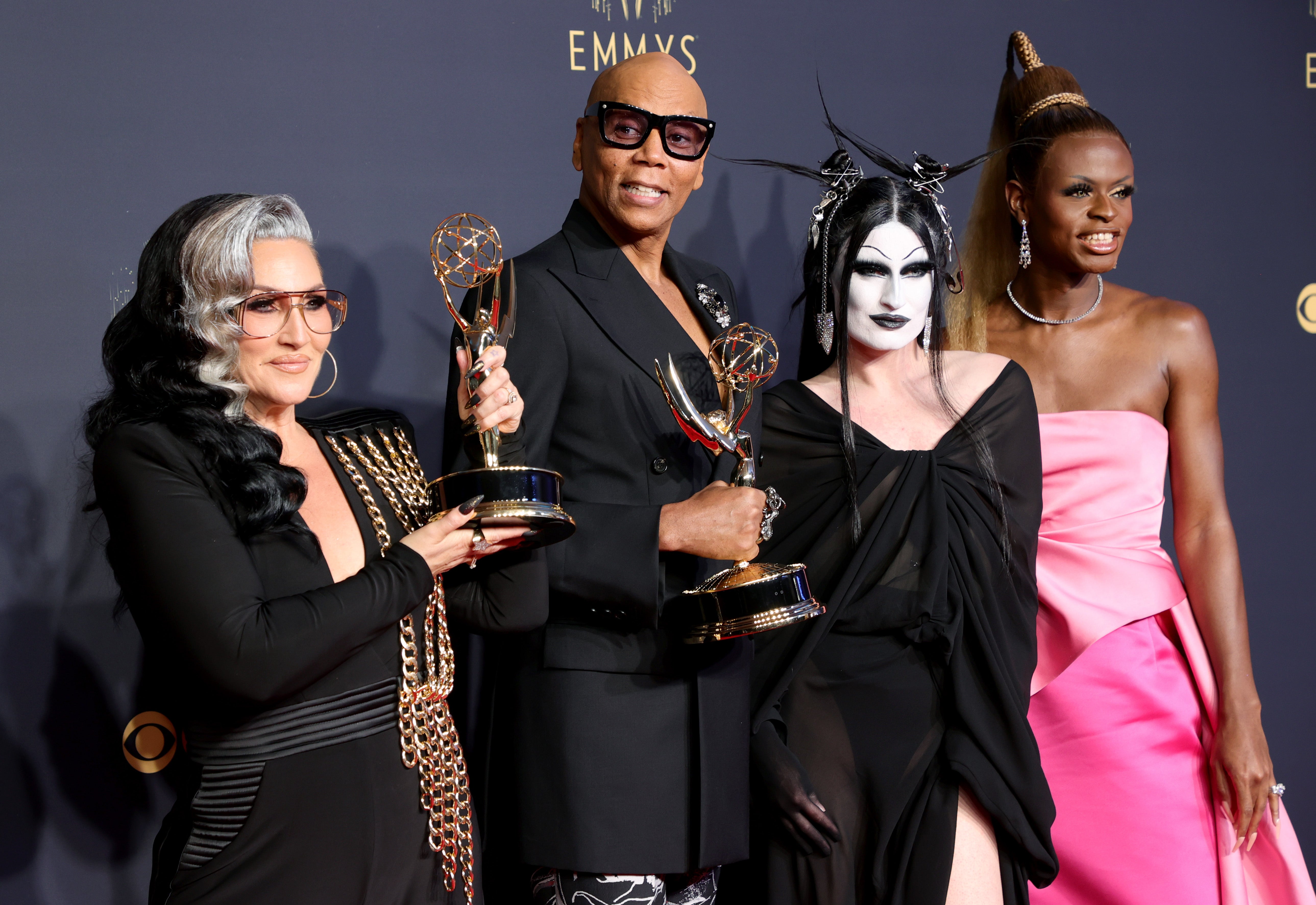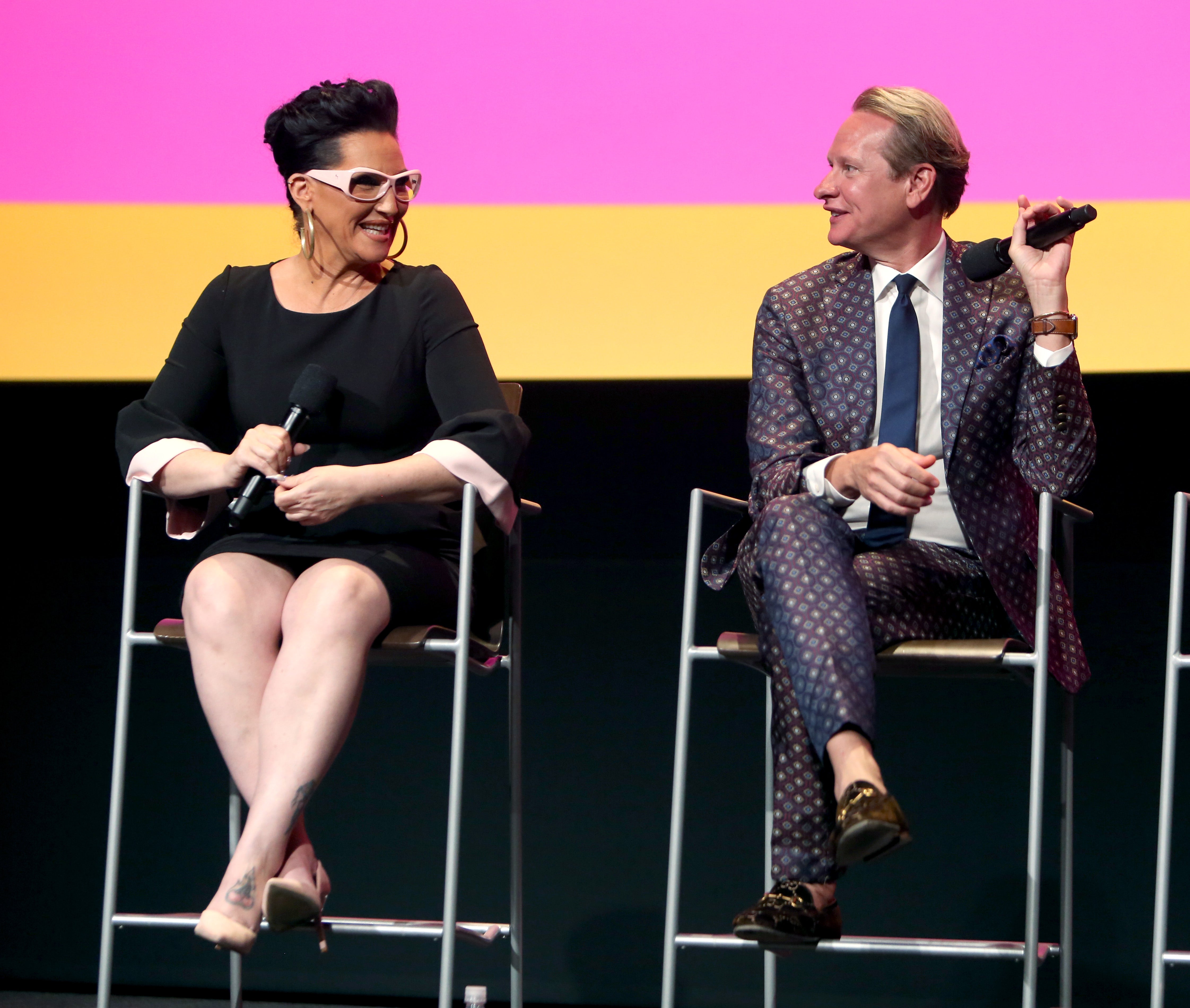Michelle Visage: ‘I’m not anti plastic surgery, I’m pro transparency’
The ‘RuPaul’s Drag Race’ judge talks to Isobel Lewis about her new BBC podcast, the importance of defending queer history, why sexism pushes women towards surgery and the problems it has caused in her own life


Your support helps us to tell the story
From reproductive rights to climate change to Big Tech, The Independent is on the ground when the story is developing. Whether it's investigating the financials of Elon Musk's pro-Trump PAC or producing our latest documentary, 'The A Word', which shines a light on the American women fighting for reproductive rights, we know how important it is to parse out the facts from the messaging.
At such a critical moment in US history, we need reporters on the ground. Your donation allows us to keep sending journalists to speak to both sides of the story.
The Independent is trusted by Americans across the entire political spectrum. And unlike many other quality news outlets, we choose not to lock Americans out of our reporting and analysis with paywalls. We believe quality journalism should be available to everyone, paid for by those who can afford it.
Your support makes all the difference.Michelle Visage has never been fond of the rules. Growing up with an adopted family in New Jersey in the late Seventies and early Eighties, the TV personality learnt that the only way to stand up for what’s right was by going against the grain. “I would get in trouble for certain things but I was always like, ‘But mom if I didn’t [do] X, Y and Z, if I didn’t fight for this person, they would have gotten beat up,’ or, ‘If I didn’t try to get this I never would have gotten that job,’” she tells me. “Things were most definitely not handed to me.”
Throughout her career, Visage has refused to fit into a neat little box. In 1988, she found fame in the girl group Seduction, then joined the S.O.U.L. S.Y.S.T.E.M. as lead vocalist, and featured on The Bodyguard soundtrack. She then blagged a job in radio, simply by telling the station: “‘Oh yeah, sure. I’ve done radio.’” There have been stints on reality TV, such as Strictly Come Dancing and Celebrity Big Brother. But to most fans, she’s undeniably best known as RuPaul’s sharp-tongued, green-hating right-hand woman on RuPaul’s Drag Race, as well as its All Stars spin-off and British and Australian international versions. Visage has two daughters in their twenties with David Case, her husband of 25 years. Yet it’s also an honour to think of herself as an adoptive parent to the show’s millions of LGBTQ+ fans around the world.
Visage feels a similar connection to many of the show’s contestants, having been a producer on Drag Race since season 11. As she’s a producer, I ask her about a song recently released by RuPaul titled “Blame It on the Edit”, a reference to reality TV contestants complaining that their words have been twisted in the editing process to portray them unfairly on screen. “Go on and take the credit, b****, you the one who said it, b****/ How you go’ regret it?” RuPaul sings on the track, which some fans loved while others called it “petty” and “shady”.
“Every single person blames the edit,” she says. “I was on Big Brother – of course they could put out whatever they wanted on me. And that’s just the way it is. But to be fair, when you film for 24 hours or you film for 13 hours, do you think something’s gonna get edited? If you do a show for 12 hours and you think it’s not gonna get edited, then you’re in the wrong business because nobody’s watching a 12-hour show. You cannot watch it all.”
Visage’s long-standing friendship with RuPaul was formed within the New York ballroom scene of the 1980s, the birthplace of voguing and a haven for LGBTQ+ people that was recently immortalised in the TV series Pose. Many of the members of the community had been cast out by their families, forming their own families or “houses”. It might not seem the most obvious place for “a little white kid with blonde hair” clutching a fake ID, but it gave her “a sense of community like I’ve never had before”.
“You’d hear these stories about people being discovered at these nightclubs, so I would go out to the Palladium with a fake ID and I’d dance and do my thing and that’s when I was kind of found by the LGBTQIA+ community and brought into a house,” she says. “I was the only Caucasian person in a house full of the most colourful, beautiful people… There wasn’t hate, there wasn’t cancel culture. If you had to battle, you battled it out at the ballroom, you battled it out on the dance floor.”
Drag Race is steeped in references to the ballroom scene and the 1990 documentary that captured it, Paris Is Burning. “If we don’t keep history alive, who will?” she says. “Queer culture and queer history is already in peril, people are trying to take it away [and] reverse everything that we’ve worked for and our elders have fought for and trailblazed.” At a time when LGBTQ+ rights are being reversed, with measures such as the “Don’t Say Gay” bill in Florida banning education about sexuality and gender, Visage says “it’s important to know the references, it’s important to know about Stonewall, it’s important to know about why there is a pride month. These things matter.”

When Visage first met RuPaul, the drag queen was yet to achieve international renown with her song “Supermodel (You Better Work)”. The pair are frequent collaborators, with Visage joining RuPaul’s Drag Race as a permanent judge in season three. Of course, she never could have predicted that the reality TV show would go on to become the behemoth it is now (at the time of writing, there are 11 different international versions, as well as All Stars seasons and various other spin-offs). But she did know it was something special.
“When they told me about it, I was like, ‘Oh my god, this is the most amazing idea’, I couldn’t even believe it,” she says. “But it was made by queer people for queer people on a very queer, very small network, LogoTV, who believed in it from the beginning… It was this little tiny engine that could. It took us to series nine to even get an Emmy nomination.”

Watch Apple TV+ free for 7 days
New subscribers only. £8.99/mo. after free trial. Plan auto-renews until cancelled

Watch Apple TV+ free for 7 days
New subscribers only. £8.99/mo. after free trial. Plan auto-renews until cancelled
At this point, self-confessed Anglophile Visage is a mainstay of the UK media, too. As well as Big Brother and Strictly (where she got to perform a routine to her hero Madonna’s “Vogue”), she has appeared in the stage musical Everybody’s Talking About Jamie (Sheffield accent and all) and presented on Radio 2. It’s with the latter that she’s created Rule Breakers, her interview podcast series for BBC Sounds. She used to host the podcast What’s The Tee? with RuPaul, but this time is going it alone.
Listen to the podcast and it’s clear that Visage is a great listener, able to connect with her guests (such as Cameron Diaz, Dawn French and Marc Jacobs) with ease. “I feel honoured that they want to talk to me because if you think about it, with 70,000 podcasts in the world, probably more than that, people get asked every single day.”

In the first episode, a rare post-acting retirement interview with Diaz, the pair discussed their experiences of “heavy, heavy misogyny” in Hollywood, especially as they’ve got older. “You realise, ‘Oh my goodness, show business is so sexist,’ It really is,” Visage says. She’s watched women “fall victim” to the pressures of the industry, only to regret the fillers and the surgery. “You’ll see them saying, ‘I wish I didn’t do that’, but we feel like we have to keep up with it,” she says. “It isn’t right but ageism will always exist in Hollywood.”
The pressure to have surgery is something Visage is acutely aware of. She had her first boob job aged 21 (and two more over the years), with her breasts being a regular source of comic material on Drag Race (“Michelle was in a group called Seduction. What that b**** really needs is a reduction,” season six winner Bianca Del Rio jokes in one video). “I was in a house that my father was a subscriber to Playboy, and I would see these magazines and Penthouse and the common denominator was everybody had huge breasts and [was] very thin and I was never either one of those things,” she says. “The first thing I did when I got my first paycheque when I was in a girl group was ran and got breast implants.”
In 2019, Visage revealed that she had been struggling with Hashimoto’s disease, an autoimmune condition, for many years and was having her implants removed and documenting the process in a film called Explant. She’d long suspected that they were the thing making her ill, but in a story many women will recognise, doctors didn’t believe her. “It took me years to figure it out but I did it on my own. I was the best Murder, She Wrote person… doing my best Angela Lansbury to find out what was going on in my body.”
A big part of releasing the documentary, she says, was to show young people the realities of plastic surgery. “I think it’s important that the message gets out there so we can make an informed decision because nobody’s going to advocate for you more than you are,” she says. “If you have the information, then you can know what you’re getting into… I’m not anti plastic surgery, I’m pro transparency.”
Michelle Visage’s Rule Breakers is on BBC Sounds now



Join our commenting forum
Join thought-provoking conversations, follow other Independent readers and see their replies
Comments